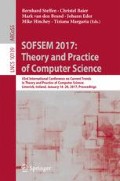Abstract
We propose behavioral specification theories for most equivalences in the linear-time–branching-time spectrum. Almost all previous work on specification theories focuses on bisimilarity, but there is a clear interest in specification theories for other preorders and equivalences. We show that specification theories for preorders cannot exist and develop a general scheme which allows us to define behavioral specification theories, based on disjunctive modal transition systems, for most equivalences in the linear-time–branching-time spectrum.
Most of this work was carried out while the first author was still employed at Inria Rennes, France.
Access this chapter
Tax calculation will be finalised at checkout
Purchases are for personal use only
References
Aceto, L., Fábregas, I., de Frutos-Escrig, D., Ingólfsdóttir, A., Palomino, M.: On the specification of modal systems. Sci. Comput. Program. 78(12), 2468–2487 (2013)
Aceto, L., Fokkink, W., van Glabbeek, R.J., Ingólfsdóttir, A.: Nested semantics over finite trees are equationally hard. Inf. Comput. 191(2), 203–232 (2004)
Antonik, A., Huth, M., Larsen, K.G., Nyman, U., Wąsowski, A.: 20 years of modal and mixed specifications. Bull. EATCS 95, 94–129 (2008)
Bauer, S.S., David, A., Hennicker, R., Guldstrand Larsen, K., Legay, A., Nyman, U., Wąsowski, A.: Moving from specifications to contracts in component-based design. In: Lara, J., Zisman, A. (eds.) FASE 2012. LNCS, vol. 7212, pp. 43–58. Springer, Heidelberg (2012). doi:10.1007/978-3-642-28872-2_3
Bauer, S.S., Fahrenberg, U., Juhl, L., Larsen, K.G., Legay, A., Thrane, C.: Weighted modal transition systems. Form. Meth. Syst. Design 42(2), 193–220 (2013)
Bauer, S.S., Juhl, L., Larsen, K.G., Legay, A., Srba, J.: Extending modal transition systems with structured labels. Math. Struct. Comput. Sci. 22(4), 581–617 (2012)
Beneš, N., Černá, I., Křetínský, J.: Modal transition systems: composition and LTL model checking. In: Bultan, T., Hsiung, P.-A. (eds.) ATVA 2011. LNCS, vol. 6996, pp. 228–242. Springer, Berlin (2011). doi:10.1007/978-3-642-24372-1_17
Bertrand, N., Legay, A., Pinchinat, S., Raclet, J.: Modal event-clock specifications for timed component-based design. Sci. Comput. Program. 77(12), 1212–1234 (2012)
Brookes, S.D., Hoare, C.A.R., Roscoe, A.W.: A theory of communicating sequential processes. J. ACM 31(3), 560–599 (1984)
Bujtor, F., Sorokin, L., Vogler, W.: Testing preorders for dMTS: deadlock- and the new deadlock/divergence-testing. In: IEEE Computer Society, ACSD (2015)
Bujtor, F., Vogler, W.: Failure semantics for modal transition systems. ACM Trans. Embed. Comput. Syst. 14(4), 67 (2015)
Caillaud, B., Raclet, J.-B.: Ensuring reachability by design. In: Roychoudhury, A., D’Souza, M. (eds.) ICTAC 2012. LNCS, vol. 7521, pp. 213–227. Springer, Berlin (2012). doi:10.1007/978-3-642-32943-2_17
David, A., Larsen, K.G., Legay, A., Nyman, U., Traonouez, L., Wasowski, A.: Real-time specifications. STTT 17(1), 17–45 (2015)
Fahrenberg, U., Legay, A.: General quantitative specification theories with modal transition systems. Acta Inf. 51(5), 261–295 (2014)
Fahrenberg, U., Legay, A.: The quantitative linear-time-branching-time spectrum. Theor. Comput. Sci. 538, 54–69 (2014)
Fahrenberg, U., Legay, A.: A linear-time branching-time spectrum of behavioral specification theories (2016). http://arxiv.org/abs/1604.06503
Groote, J.F., Vaandrager, F.W.: Structured operational semantics and bisimulation as a congruence. Inf. Comput. 100(2), 202–260 (1992)
Hennessy, M., Milner, R.: Algebraic laws for nondeterminism and concurrency. J. ACM 32(1), 137–161 (1985)
Hoare, C.A.R.: Communicating sequential processes. Commun. ACM 21(8), 666–677 (1978)
Larsen, K.G.: A context dependent equivalence between processes. Theor. Comput. Sci. 49, 184–215 (1987)
Larsen, K.G.: Modal specifications. In: Sifakis, J. (ed.) CAV 1989. LNCS, vol. 407, pp. 232–246. Springer, Berlin (1990). doi:10.1007/3-540-52148-8_19
Guldstrand Larsen, K.: Ideal specification formalism = expressivity + compositionality + decidability + testability +. In: Baeten, J.C.M., Klop, J.W. (eds.) CONCUR 1990. LNCS, vol. 458, pp. 33–56. Springer, Heielberg (1990). doi:10.1007/BFb0039050
Larsen, K.G., Skou, A.: Bisimulation through probabilistic testing. In: POPL, ACM Press (1989)
Larsen, K.G., Xinxin, L.: Equation solving using modal transition systems. In: LICS. IEEE Computer Society (1990)
Milner, R.: Calculi for synchrony and asynchrony. Theor. Comput. Sci. 25(3), 267–310 (1983)
Park, D.: Concurrency and automata on infinite sequences. In: Deussen, P. (ed.) GI-TCS 1981. LNCS, vol. 104, pp. 167–183. Springer, Heidelberg (1981). doi:10.1007/BFb0017309
Pnueli, A.: Linear and branching structures in the semantics and logics of reactive systems. In: Brauer, W. (ed.) ICALP 1985. LNCS, vol. 194, pp. 15–32. Springer, Heidelberg (1985). doi:10.1007/BFb0015727
Raclet, J., Badouel, E., Benveniste, A., Caillaud, B., Legay, A., Passerone, R.: A modal interface theory for component-based design. Fund Inf 108(1–2), 119–149 (2011)
Raclet, J.-B.: Residual for component specifications. Electr. Notes Theor. Comput. Sci. 215, 93–110 (2008)
Stirling, C.: Modal and temporal logics for processes. In Banff Higher Order Workshop. LNCS, 1043. Springer, Heidelberg (1995)
van Glabbeek, R.J.: The linear time - branching time spectrum I. In: Handbook of Process Algebra, Chap. 1. Elsevier (2001)
Vogler, W.: Failures semantics and deadlocking of modular Petri nets. Acta Inf. 26(4), 333–348 (1989)
Vogler, W.: Modular Construction and Partial Order Semantics of Petri Nets. LNCS, vol. 625. Springer, Heidelberg (1992)
Author information
Authors and Affiliations
Corresponding author
Editor information
Editors and Affiliations
Rights and permissions
Copyright information
© 2017 Springer International Publishing AG
About this paper
Cite this paper
Fahrenberg, U., Legay, A. (2017). A Linear-Time–Branching-Time Spectrum of Behavioral Specification Theories. In: Steffen, B., Baier, C., van den Brand, M., Eder, J., Hinchey, M., Margaria, T. (eds) SOFSEM 2017: Theory and Practice of Computer Science. SOFSEM 2017. Lecture Notes in Computer Science(), vol 10139. Springer, Cham. https://doi.org/10.1007/978-3-319-51963-0_5
Download citation
DOI: https://doi.org/10.1007/978-3-319-51963-0_5
Published:
Publisher Name: Springer, Cham
Print ISBN: 978-3-319-51962-3
Online ISBN: 978-3-319-51963-0
eBook Packages: Computer ScienceComputer Science (R0)

